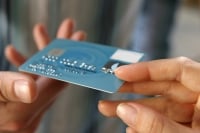 Does it seem like your debt just keeps growing? If so, you’re not alone. Americans’ total credit card debt rose 8 percent in 2017, to a whopping $905 billion, based on a NerdWallet survey. Here are some insights into the easy mistakes that can cause debt to pile up, along with tips on how to limit on what you owe.
Does it seem like your debt just keeps growing? If so, you’re not alone. Americans’ total credit card debt rose 8 percent in 2017, to a whopping $905 billion, based on a NerdWallet survey. Here are some insights into the easy mistakes that can cause debt to pile up, along with tips on how to limit on what you owe.
Mistake No. 1: Collecting Credit Cards
Consumers are bombarded by offers for credit cards, but don’t be tempted! Once you get a new card, it’s easy to use it, which could lead to spending more than you intended — and more than you can afford. Running up credit card balances will only increase your debt and the amount of interest you will end up paying. The solution is to be strategic: Don’t charge more than you can afford to pay off each month. Stick with one card and don’t sign up for any new ones.
Mistake No. 2: Paying Only the Minimum
Even if you can’t currently afford to pay off your entire credit card balance, paying as much as possible each month will help minimize your interest costs and save you money over time. It may seem easy to pay only the minimum required, but this is a costly error.
Mistake No. 3: Not Budgeting or Saving
It’s easy to overspend if you don’t know how much you have available to spend each month, which is why creating a budget is so important. Add up all your monthly income, and then subtract all your monthly expenses, such as housing, utilities, phone service, commuting, food and other costs. Adjust your spending if your income doesn’t cover your expenses, or make plans for how to allocate any money left over if you earn more than you spend. A budget can also help you spot and trim unnecessary expenses or expenses that are higher than you realized. Be sure to make room in your budget for establishing and maintaining an emergency fund so that you don’t have to borrow to cover unexpected costs.
Mistake No. 4: Spending Tomorrow’s Money Today
This problem can occur in two ways. First, you lose some part of your income, but you don’t change your spending because you think you’ll probably be able to replace that income soon. In the meantime, you’re going to be racking up debt, and it may take longer than you thought to restore your income—which can lead to even more debt. Another mistake can happen when you are expecting to get a new higher-paying job or a windfall of some kind, and you start spending now as if that money were already in the bank. In both cases, the best approach is to adjust your spending to reflect the funds you actually have today.
Mistake No. 5: Not Rewarding Yourself for Your Accomplishments
You know that minimizing debt has many benefits, but you’re more likely to succeed at it if you celebrate a little when you’ve finally reached a milestone, such as paying off a credit card or lowering your debt by a certain amount. Don’t break the bank, but do consider giving yourself a night out or some other small treat. A reward will help motivate you to keep going until you’re debt-free, and make it less likely that you’ll slip up and overspend again.
Consult Your Local CPA
Every day, local CPAs offer clients expert advice on a wide variety of financial concerns, including making a major purchase or obtaining a loan. Whatever your financial questions, your CPA can help you find the answers.
{{cta(‘b05cee88-dbcc-43c2-af17-c5fc17122a75’)}}
Republished with permission from the New Jersey State Society of CPAs